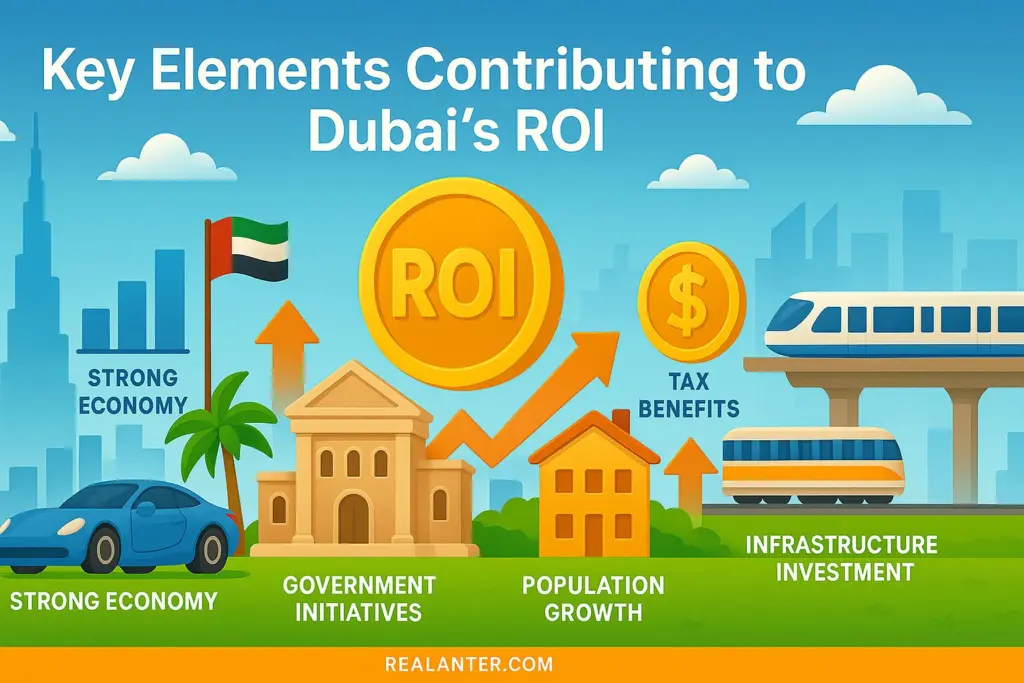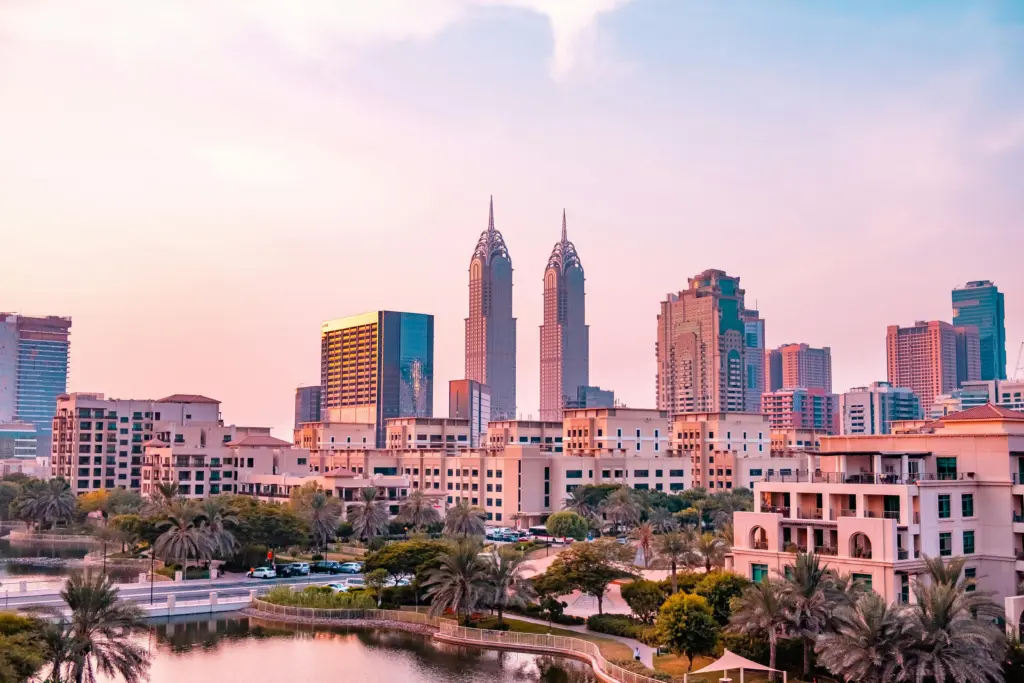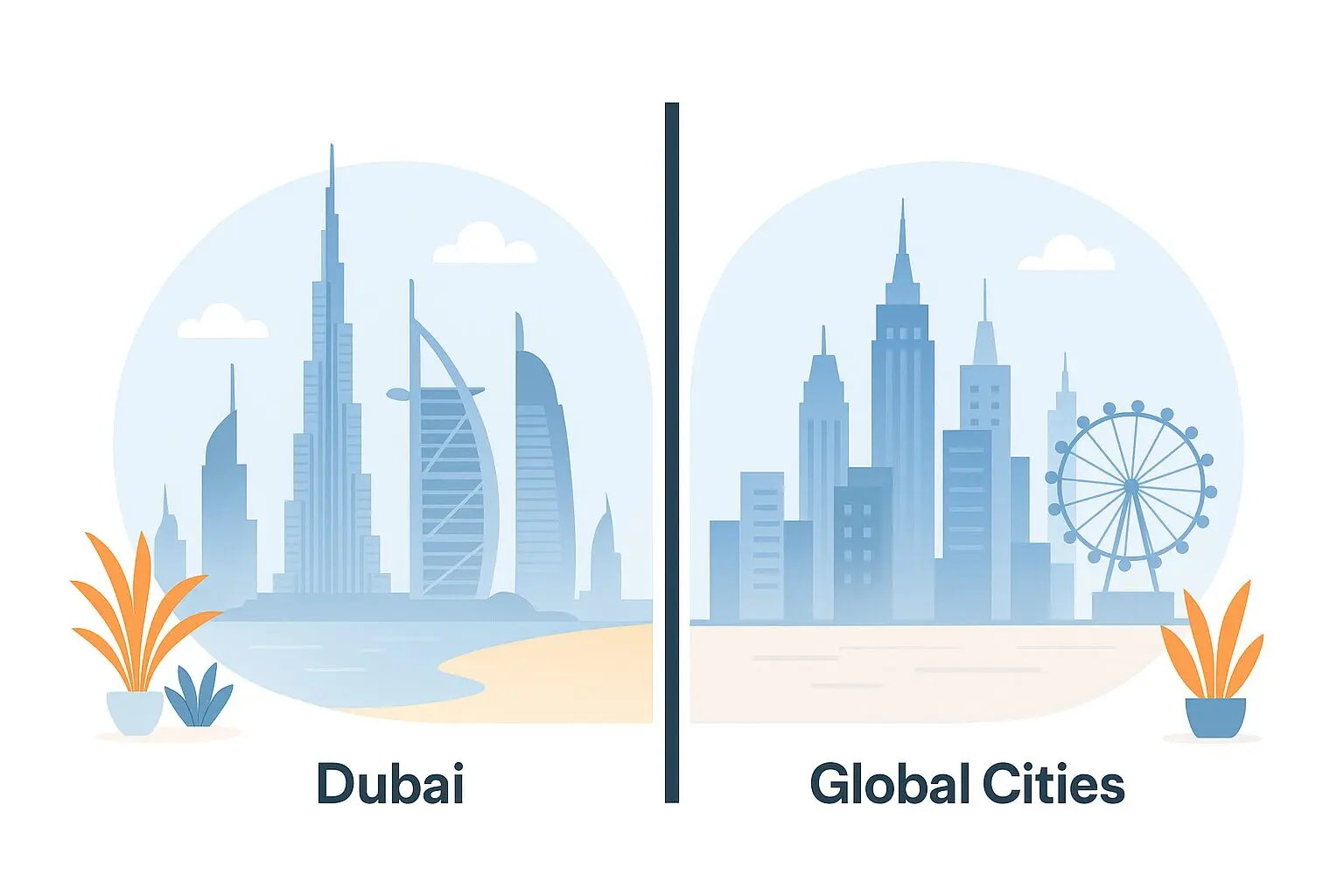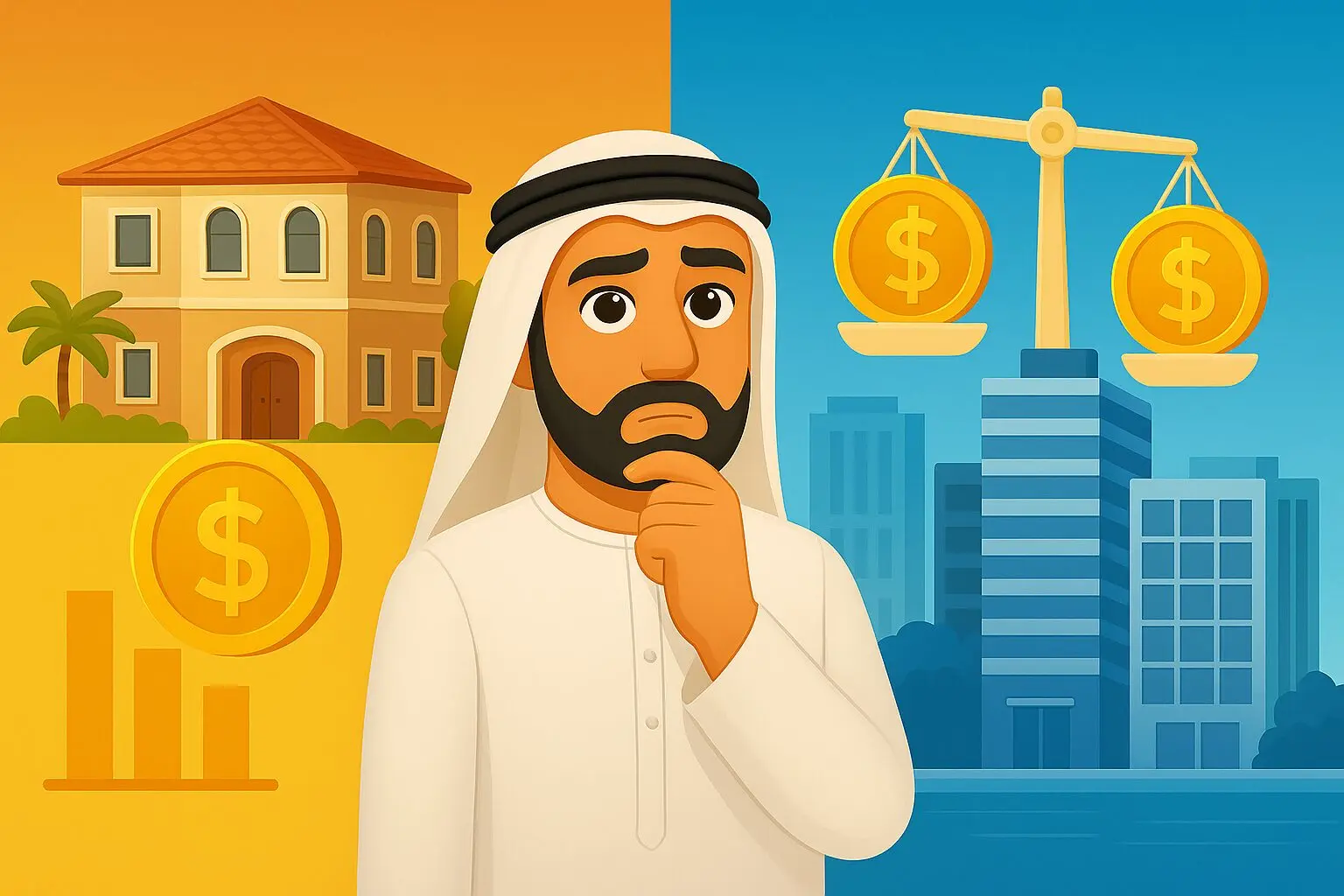The real estate market in Dubai has become a leader world-wide, attracting investors because of the exceptional returns, tax-free status, and unmatched quality of life. But how does it compare to other prominent centers such as London, New York City (NYC), and Singapore?
This extensive article of 2500 words does an analysis of Dubai vs London real estate, Dubai vs New York property prices, and Dubai vs Singapore housing market along with other important cities such as Abu Dhabi, Hong Kong, Miami, Paris, Berlin, Istanbul, Bangkok, and Riyadh.
Why Dubai’s Real Estate Market Stands Out
Dubai’s real estate market is unique, standing out due to the city’s geographic location, the policies offered to international investors, and the urban development vision such as the Dubai 2040 Urban Maritime Plan which strives to build an inclusive sustainable city and incorporate smart city technologies into positive and green city initiatives infrastructure while prioritizing green spaces.
Dubai real estate transactions reach $170.2 billion in value until November 2024, which is a staggering value. In comparison to 2023, the increase in transaction volume was around 38%. The increase in property transactions corresponds to the surge in high-net-worth individual (HNWI) demand because Dubai provides tax-free living and high rental returns and gives Golden Visa access through property investments starting at AED 2 million ($545,000).
Dubai attracts investors through its vision of future-focused development. Dubai showcases three landmark developments Palm Jumeirah Burj Khalifa and Dubai Marina that fuse upscale residence with high-tech innovations. The long-term resilience of Dubai is powered by the government’s sustainable development priorities which attract environmentally focused investors to the Dubai Sustainable City. This article conducts a market analysis between Dubai’s real estate sector and 10 international cities using key performance indicators encompassing property value assessment alongside rental returns and tax advantages alongside establishment laws and life quality provisions.
Price Comparison: Dubai vs Global Cities
The value of properties represents essential information for all real estate investment analysis. The player segment of the real estate market in Dubai enables luxury home purchases at discount prices compared to the luxury housing market in other worldwide cities.
The Wealth Report – 2024 | Knight Frank Research reveals that a million dollars gives you nearly 1000 square feet of prime residential spaces throughout Dubai whereas New York offers 360 square feet and London provides 350 square feet and you can get 170 square feet from Monaco. Luxury property buyers find Dubai appealing because its affordable prices integrate with top-notch construction quality features and lavish amenities.
Below is a detailed price comparison of average residential prices
| City | Price per Sq.Ft (USD) | Source |
| Dubai | $438 | Knight Frank 2024 |
| London | $1,474 | Savills 2025 |
| New York City | $1,366 | Knight Frank 2024 |
| Singapore | $1,200 | Global Property Guide 2025 |
| Hong Kong | $2,857 | Global Property Guide 2025 |
| Abu Dhabi | $350 | Property Monitor 2025 |
| Miami | $600 | Elite Merit Real Estate 2025 |
| Paris | $1,586 | Global Property Guide 2025 |
| Berlin | $732 | Global Property Guide 2025 |
| Istanbul | $250 | Property Monitor 2025 |
| Bangkok | $400 | Global Property Guide 2025 |
| Riyadh | $300 | Elite Merit Real Estate 2025 |
Detailed Analysis of Price Trends
- Dubai vs London Real Estate: London maintains expensive property values through its international financial dominance along with constrained lands. Kensington and Mayfair demand more than $2,000 per square foot as their premium real estate prices but Downtown Dubai and Palm Jumeirah properties remain accessible at $600–800 per square foot. The differences in property prices enable Dubai investors to get bigger luxurious homes within an equivalent budget range.
- Dubai vs New York Property Prices: The real estate market in Manhattan and Brooklyn stands as one of the most expensive in the world resulting in Manhattan luxury condos having an average market value of $1,800 per square foot. Investors who desire high-end properties at prices below New York City’s levels should consider purchasing in Dubai because of its reasonable expenses combined with contemporary infrastructure.
- Dubai vs Singapore Housing Market: Singapore maintains an inflated real estate market because of its limited geographical area combined with stringent government controls. The upscale Orchard Road prime area commands a dollar per square foot rate of $1,500 whereas Dubai stands at $438. Risk-averse investors will find Singapore a safer investment due to its conservative economy and its spotless record on corruption.
ROI and Rental Yields: Dubai’s Competitive Strengths
Leading locations like Downtown Dubai, Dubai Marina, and Jumeirah Village Circle return incredible rental yields of ten to twelve percent and Dubai’s average rental yields sit between six and seven percent. This, coupled with record setting tourism figures during events like the EID, expands the scope of rental demand throughout the calendar year.
Unlike other segments such as New York, Singapore, or London where rental yields do not exceed four percent. The relationship between purchasing price and demand tends to suppress rentals widely.
Focusing on investments aimed at generating passive income, especially real estate Dubai is remarkably favorable. Dubai’s rental yields are almost twice that of New York. As a result, rental-income focused investments pay off significantly over time. Above average-yield emerging areas such as Jumeirah Village Circle and Dubai South ensure even greater rental income in the most competitive markets.
Rental Yield Comparison Across Cities
| City | Average Rental Yield | Estimated ROI |
| Dubai | 6–7% | 6–8% |
| London | 2–4% | 3–4% |
| New York City | 3–5% | 3–5% |
| Singapore | 2–4% | 2–3% |
| Hong Kong | 2–3% | 2–3% |
| Abu Dhabi | 5–6% | 5–7% |
| Miami | 4–6% | 4–6% |
| Paris | 2–3% | 2–4% |
| Berlin | 3–4% | 3–5% |
| Istanbul | 5–7% | 6–8% |
| Bangkok | 5–6% | 5–7% |
| Riyadh | 4–5% | 4–6% |
Key Elements Contributing To Dubai’s ROI

The remarkable rental yields and ROI offered by Dubai are not purely a result of market mechanics, but rather a sophisticated combination of demographic, economic, and infrastructural elements. These factors serve to bolster the ecosystem conducive to both rental income and capital appreciation, further distinguishing Dubai from the rest of the world:
- Investment in Real Estate: Dubai’s property market experienced an increase in value by 16.5% YoY in 2024, driven by infrastructure developments such as expansion of the Dubai Metro and the Al Maktoum International Airport.
- Expatriate driven demand: The increasing non-emirati population Dubai (with over 80% of citizens being non-emirati) accelerates the family-oriented rental property boom in regions such as Dubai Hills Estate and Arabian Ranches.
- Increase of short term rentals: The growth of companies like Airbnb has increased demand for short term rentals in tourist destinations such as Palm Jumeriah where rentals can yield 15-20% higher returns in comparison to long-term leases.
- Major Observation: Investors focused on ROI truly benefit from Dubai’s rapid property value increase and high rental yields. Despite being stable, London and NYC are costly to acquire and heavily taxed which diminishes their income potential.
Tax Efficiency: The Zero-Tax Haven of Dubai
One of the main factors contributing to Dubai’s appeal is its tax-free environment. Investors can keep all of their profits because there is no income tax, capital gains tax, or property tax on rental income. In contrast, taxes greatly reduce returns in other global cities:
- London: Investors must pay capital gains tax (up to 28%), council tax on rental properties, and stamp duty land tax (up to 12% for high-value properties).
- New York City: State income tax, capital gains tax (up to 20%), and annual property taxes (1%–2%) all lower net returns.
- Singapore: It is expensive for non-residents due to a progressive property tax of up to 32% and Additional Buyer’s Stamp Duty of 20% for foreigners.
Tax Comparison Across Cities
| City | Property Tax | Capital Gains Tax | Stamp Duty/Transfer Tax |
| Dubai | 0% | 0% | 4% (one-time) |
| London | 1–2% (council) | Up to 28% | Up to 12% |
| New York City | 1–2% | Up to 20% | 1–2.5% |
| Singapore | Up to 32% | 0% (but high duties) | 20% (foreigners) |
Dubai’s ROI is a clear leader due to the absolute absence of taxes when compared to the tax-heavy London, NYC, and Singapore. DLD Transfer Fee Dubai: 4% Fee on property purchase compared to the taxes that have to be paid repeatedly in other cities.
Entry Barriers & Regulations: Ease of Investment
By enabling absolute foreign ownership of freehold properties, like those located in Palm Jumeirah and Dubai Marina, Dubai is ranked as one of the most popular investment destinations globally. The simple purchase procedure, which involves only a 10 to 25% deposit, enhances Dubai’s popularity. The Golden VISA program which offers long-term residency of upto 10 years for investment worth AED 2 Million or $545,000 further helps in securing long term investments. Regulatory comparison:
- Dubai: Eligibility for Golden VISA and other minimal requirements compared to paperwork and no restrictions on foreign ownership within freehold regions.
- London: Possibility of overseas buyers is not encouraged with an additional stamp fee of 2%. No incentives, complex legal documentation for non-residents.
- Indonesia’s New York City: Foreigners have no ownership restrictions but stringent requirements regarding visas such as the EB-5 are imposed along with excessive transaction fees.
- Singapore: Citizens from foreign countries encounter 20% additional stamp duty and are confined to specific property types.
Key Insight: The entirety of Dubai’s market system, such as the weak barriers to entry and the issued visas, make it easier for foreigners to invest in compared to Singapore’s policies and the expensive London real estate.
Lifestyle & Investor Sentiment: Why HNWIs Choose Dubai
The vibrant lifestyle that Dubai offers is one of the main reasons why investors and residents are being attracted to the city. Opportunities and services in Dubai includes; sunshine all year, world-class amenities like Michelin-starred restaurants, luxury malls, and safety with a low crime rate (safety index of 83.65/100 compared to NYC’s 52.58/100). The fact that 95% of real estate located on Palm Jumeirah is owned by foreign investors is a huge testament to the grandeur of Dubai as a city for extravagant living. Lifestyle comparison
- Dubai vs London Real Estate: London has its advantages with rich cultural heritage and top-tier education, however, the living cost is exceptionally high alongside the price of real estate. Unlike Dubai, which offers modern infrastructure coupled with tax-free living, Dubai is more favorable and need relaxing luxurious living.
- Dubai vs New York Property Prices: The fast-paced nature of NYC, as well as the diverse culture, is undefeated. On the other hand, crime rates and the sheer expensive nature of lifestyle make it an unfavorable region for families. HNWIs, however, prefer Dubai because of its affordability and low rate.
- Dubai vs Singapore Housing Market: Unlike Singapore, Dubai offers the emirate’s luxurious lifestyle, infrastructure, safety, and modern living.
Key Insight: The combination of luxury, safety, and affordability makes Dubai appealing to HNWIs which has shifted investor sentiment from traditional hubs like New York and London towards this Middle Eastern Jewel.

Practical Recommendations for Investors
Investing in real estate in Dubai requires an expert approach to harness the unique opportunities available in the city as it is fast growing. The following recommendations offer steps to take concerning Dubai vs London real estate, Dubai vs New York property prices, and Dubai vs Singapore housing market to ensure optimal Dubai investment results:
- Invest in Off-Plan Properties: The low starting price and easy payment structures attract many investors, with projected value increases of 15-30% by project completion.
- Understand the Inner-City Freehold Regions: Develop core knowledge of Dubai’s freehold stipulations and contact agencies such as PHOREE Real Estate who offer tailored solutions for property purchasing hurdles.
- Build Trust with Developers: Strategically work with renowned partners such as Emaar Properties for excellent service delivery and property quality.
- Understand Legal Guidelines: Engage actively with regions allowing full ownership and educate through agencies such as PHOREE Real Estate achievable dreams of absolute ownership. Seek out local laws and work with agencies PHOREE active leases.
- Mitigate risks: Combine residential, commercial, and short-term rental properties to strengthen risk mitigation and overall returns.
- Use of Financial Leverage: Dubai’s non-resident mortgage options are favorable with rates between 3-5% and an 80% loan to value cap.
Comparison Table: Global Cities vs. Dubai
| Metric | Dubai | London | New York City | Singapore |
| Price per Sq.Ft (USD) | $438 | $1,474 | $1,366 | $1,200 |
| Rental Yield | 6–7% | 2–4% | 3–5% | 2–4% |
| Capital Gains Tax | 0% | Up to 28% | Up to 20% | 0% (but high stamp duty) |
| Foreign Ownership | Freehold in designated areas | Full ownership | Full ownership | Restricted |
| Visa Incentives | Golden Visa (AED 2M+) | None | None | None |
| Lifestyle Rating | High (sunshine, safety) | High (culture, history) | High (diversity) | High (modernity) |
Dubai vs Global Real Estate: Frequently Asked Questions
Actively ROI-driven investors are drawn to Dubai because of the rigid tax laws in addition to the low rental yield (6 to 7%) compared to other markets like New York or London (2 to 4%), and also the reasonable price of luxury property.
Yes. Foreign nationals have unrestricted and uncomplicated access to own freehold property in Palm Jumeirah and Dubai Marina.
Families looking for community infrastructure, quality education, and vast green regions would best fit the Dubai Hills Estate, Jumeirah Village Circle, and Arabian Ranches.
Purchasing properties greater than AED 2 million ($545,000) grants the right to a 5-10 year residency visa, thus securing long-term residence in addition to access to the lavish lifestyle in Dubai.
Yes. Projects like the Dubai Sustainable City and the Dubai 2040 Urban Master Plan focuses on green development, guaranteeing long-term sustainability.
Conclusion: Why Dubai maintains Leaders in the Global Real Estate Field
Dubai has maintained its competitive edge for global tourism above other cities like London, NYC or Singapore due to its unparalleled ROI, tax-free environment, and luxurious lifestyle. While London and NYC are good for keeping business, the exorbitant costs and taxation makes profitability unfeasible.
Singapore’s tight regulated market is also not appealing to foreign investors, but Dubai’s open policies along with low barriers to entry and the Golden Visa allow the inflow of capital from all over the globe. When it comes to investors looking into long-term growth, luxury at an affordable price, and high rental yields, Dubai reigns supreme.







